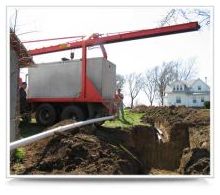Two questions people often ask about septic systems are, “How often do I need to have my tank pumped?” and “Do I need to add anything to keep the system working?”
As far as having the septic tank pumped, it’s great that the question comes up. Some people don’t realize that the tank needs pumping. This is one of the most important things you can do to keep the system functioning properly. Scum and/or sludge could build up, reducing the effective tank volume, and resulting in wastewater moving through the tank more rapidly with less treatment. In addition, solids could be carried to the drainfield if the tank is not pumped regularly. This will clog the drainfield and not allow wastewater to be treated. Wastewater may pond in the yard or back up into the house. At this point, the owner is probably facing costly repairs or replacement instead of minimal maintenance expenses.
Several factors determine tank-pumping frequency, related to the amount and characteristics of wastewater generated. One important factor is whether a garbage disposal is used. Many experts recommend pumping a tank every two to three years. Depending on use, a tank may need to be pumped more or less frequently. A safe approach is to have the tank checked annually by a certified professional until it is determined that pumping is required. Once the pumping interval is established, use that schedule until wastewater patterns change. Additional people living in the home, children becoming teenagers, the installation of a garbage disposal, or the addition of a whirlpool tub could all increase water usage and wastewater generation. Conversely, fewer people living in the home could decrease water use and wastewater generation.
What about tank additives? Research shows that septic system starters, additives, or feeders are not necessary to keep a system working and are not a solution for improperly installed, designed, or maintained systems. In some cases, additives may keep materials suspended in the wastewater and allow them to flow out of the tank where they can clog the drainfield.
Generally, do not use septic system starters, additives, or feeders. If you decide to use a starter, additive, or feeder, select one containing biological components such as bacteria, enzymes, or yeast as these will not harm the system. Do not use additives containing chemical components such as solvents or strong acids or bases. These may interfere with the treatment processes in the septic system, or may pass through the system and enter the environment, and contaminate soil or water.
More research needs to be done regarding systems that receive heavy doses of antibiotics or medicines due to the health of the occupants. Those tanks should probably be pumped more frequently, as desirable bacterial populations may be low, reducing the breakdown of solids in the tank.
More information is available in the UNL Extension NebGuide, Residential Onsite Wastewater Treatment: Septic Tank and Drainfield Maintenance, http://www.ianrpubs.unl.edu/sendIt/g1424.pdf

